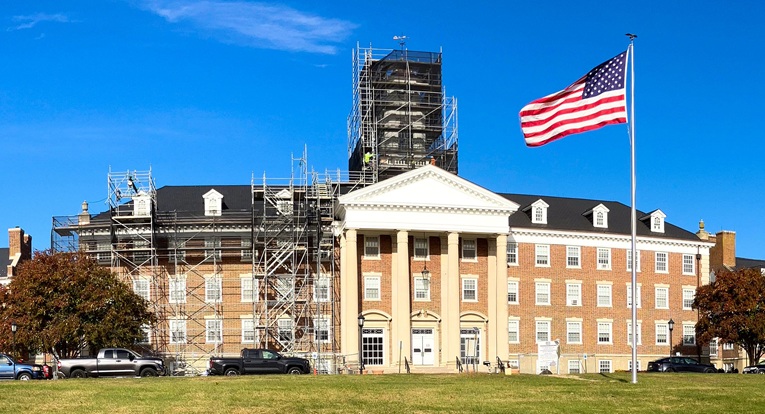Colin Hourihan is a senior staff member of the World Food Programme (WFP), which was recently announced as the 2020 Nobel Peace Prize laureate for “its efforts to combat hunger, for its contribution to bettering conditions for peace in conflict-affected areas and for acting as a driving force in efforts to prevent the use of hunger as a weapon of war and conflict.”
Hourihan, now in his early 40s, is based at the WFP headquarters in Rome, Italy, and is a veteran of many deployments to the world’s most enduring, risky or hardest-hit trouble spots.
A Greenbelt Kid
Hourihan’s connection with Greenbelt was made early – from babyhood through sixth grade and also comprised periods in nearby College Park and University Park where his family stayed between his parents’ U.S. Agency for International Development (USAID) postings.
He remembers Greenbelt as a place that shaped his view of how the world should be. He remembers Halloween in particular as an annual highlight – costumes, parades and candy. He played with friends, gathered with buddies to play ball and felt, perhaps above all, that he was safe – a scarce commodity in his future profession.
In a peripatetic life, Greenbelt is the place that still feels like home to Hourihan and is the yardstick against which he compares the lives he sees in countries wracked by war and disaster.
His cousin, Janice Lynch Schuster, who has many Greenbelt and News Review connections, was Hourihan’s devoted babysitter while she was a student at Eleanor Roosevelt High School and wrote about him for the Washington Post when the prize was announced (see washingtonpost.com/opinions/2020/11/02/prince-georges-county-nobel-peace-prize).
Nobel Prize
The WFP describes its mission as “saving lives in emergencies and using food assistance to build a pathway to peace, stability and prosperity for people recovering from conflict, disasters and the impact of climate change.” Hourihan feels the peace prize to him and his colleagues validates their work and shows the world’s awareness and appreciation for their labors and sacrifices. It bolsters them as they pursue the difficult and often dangerous quest to improve the living conditions of the many struggling to survive on the brink of catastrophe. He notes with regret that the number of people in the world living in these desperate circumstances has grown significantly over the last year. He sees the effects of increased armed conflict in already impoverished nations being amplified by the impact of the pandemic and the increased incidence of extreme weather events related to climate change. He says, with regret, that he expects this trend will continue to get worse.
Funding WFP
WFP is the world’s largest humanitarian agency and depends not on statutory contributions, as the United Nations does for its political programs, but must go directly, each year, cap-in-hand, to international governments to fund its work. Optimistically, perhaps, the Nobel Peace Prize may open those national pockets a little further. Private citizens can also contribute through wfp.org/support-us/stories/donate.
Bred in the Bone
Speaking from his base in Rome, Hourihan said that he grew up in a home where there was a commitment to a better world. His father, Dr. John J. Hourihan, an anthropologist, taught at Maryland, George Washington and Howard universities before moving to USAID. Hourihan tells us, “My father passed away the day after we received the prize. I will always be thankful I got to share that moment with him.” Hourihan’s mother, Christine Ellen Roach, continues to work providing social safety net services for foster children and veterans on the big island of Hawaii.
The family’s regular duty tours abroad brought home to the growing boy a sense of a world wider and much less fair or benevolent than his idyllic Greenbelt existence. His family also found in Greenbelt what he remembers as a much higher than usual percentage of like-minded people that his parents felt comfortable with. In his growing-up world, the emphasis was consistently on helping others and he’s always seen that as a priority for his own life.
Threats Worldwide
Hourihan noted that for a while last year, WFP operated the largest airline in the world, chartering so many planes to carry food, medical supplies, personnel and other essentials to hard-hit areas that, with commercial flights reduced, it had more planes in the air than any regular airline. Regrettably, he notes, the need to deploy such a service for the global community reflects growing short- and long-term desperate needs. His travels for the agency reflect an itinerary of mayhem, strife and destruction that include Afghanistan, the Libyan border with Egypt during Arab Spring, South Sudan and Bangladesh plus the Philippines and the Bahamas after major hurricanes. In his work, he’s everywhere a tourist doesn’t want to be.
Closer to Home
The News Review thanks Hourihan for taking out time from a busy and committed life to talk to its reporter and to Schuster for her informative Post story and being so helpful making the connection.
While it may arguably not compare to the fanfare of a Nobel Peace Prize, both have received a standing invitation to tour the News Review’s Community Center newsroom. It is situated in what was quite likely Hourihan’s kindergarten classroom.



